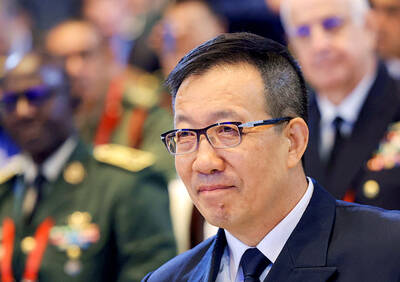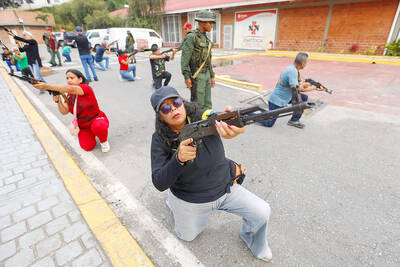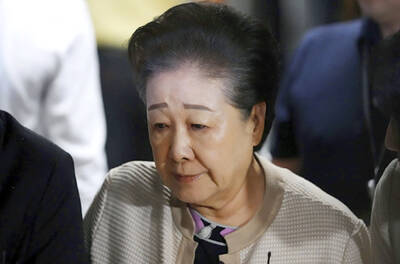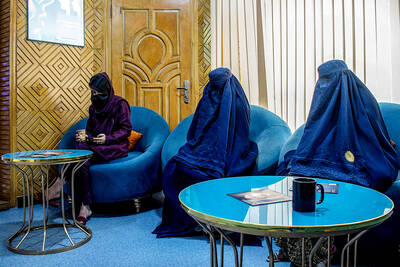A high-powered group of senior Republicans and Democrats led two missions to China in the final months of the administration of US president George W. Bush for secret back-channel negotiations aimed at securing a deal on joint US-Chinese action on climate change, the Guardian has learned.
The initiative, involving John Holdren, now the White House science adviser, and others who went on to positions in US President Barack Obama’s administration, produced a draft agreement in March, barely two months after Obama assumed the presidency.
The memorandum of understanding was not signed, but those involved in opening up the channel of communications believe it could provide the foundation for a US-Chinese accord to battle climate change as early as this autumn.
“My sense is we are now working towards something in the fall,” said Bill Chandler, director of the energy and climate program at the Carnegie Endowment for International Peace, and a driving force behind the talks. “It will be serious. It will be substantive and it will happen.”
The secret missions suggest that advisers to Obama came to power firmly focused on getting a US-China understanding in the run-up to the crucial UN meeting in Copenhagen this December, which is aimed at sealing a global deal to slash greenhouse gas emissions.
In her first policy address, US Secretary of State Hillary Clinton said she wanted to recast the broad US-China relationship around the central issue of climate change. She also stopped in Beijing on her first foreign tour.
The dialogue also challenges the conventional wisdom that Bush’s decision to pull the US out of the Kyoto treaty led to paralysis in the administration on global warming, and that China was unwilling to contemplate emissions cuts at a time of rapid economic growth.
“There are these two countries that the world blames for doing nothing, and they have a better story to tell,” said Terry Tamminen, who took part in the talks and is an environmental adviser to California Governor Arnold Schwarzenegger.
The first communications, in the fall of 2007, were initiated by the Chinese. Xie Zhenhua (謝振華), vice chairman of the National Development and Reform Commission, made the first move by expressing an interest in a cooperative effort on carbon capture and storage and other technologies with the US.
The first face-to-face meeting got off to a tentative start, with Xie falling back on China’s stated policy positions.
“It was sort of like pushing a tape recorder,” Chandler said, “[but after a short while] he just cut it off and said we need to get beyond this.”
The two sides began discussing ways to break the impasse, including the possibility that China would agree to voluntary — but verifiable — reductions of greenhouse gas emissions. China has rejected the possibility of cuts as it sees them as a risk to its continued economic growth, deemed essential to lift millions out of poverty and advance national status.
Taiya Smith, an adviser on China to former US Treasury secretary Henry Paulson, said: “The thing that came out of it that was priceless was the recognition on both sides that what China was doing to [reduce] the effects of climate change were not very well known.”
“After these discussions was a real public campaign by the Chinese government to try to make people aware of what they were doing. We started to see the Chinese take a different tone which was that ‘we are active and engaged in trying to solve the problem,” Smith said.

BEIJING FORUM: ‘So-called freedom of navigation advocated by certain countries outside the region challenges the norms of international relations,’ the minister said Chinese Minister of National Defense Dong Jun (董軍) yesterday denounced “hegemonic logic and acts of bullying” during remarks at a Beijing forum that were full of thinly veiled references to the US. Organizers said that about 1,800 representatives from 100 countries, including political, military and academic leaders, were in Beijing for the Xiangshan Forum. The three-day event comes as China presents itself as a mediator of fraught global issues including the wars in Ukraine and Gaza. Addressing attendees at the opening ceremony, Dong warned of “new threats and challenges” now facing world peace. “While the themes of the times — peace and development —

Venezuela on Saturday organized a day of military training for civilians in response to the US deployment in the Caribbean, and amid new threats from US President Donald Trump. About a month ago, Washington deployed warships to international waters off Venezuela’s coast, backed by F-35 jets sent to Puerto Rico in what it calls an anti-drug and anti-terrorism operation. Venezuelan Minister of Defense Vladimir Padrino Lopez has accused Washington of waging “undeclared war” in the Caribbean, after US strikes killed over a dozen alleged drug traffickers off his country’s coast. Caracas also accused the US of seeking regime change, and

BRIBERY ALLEGATIONS: A prosecutor said they considered the risk of Hak-ja Han tampering with evidence to be very high, which led them to seek the warrant South Korean prosecutors yesterday requested an arrest warrant for the leader of the Unification Church, Hak-ja Han, on allegations of bribery linked to the country’s former first lady and incitement to destroy evidence. The move came a day after the 82-year-old was questioned over her alleged role in bribing former first lady Kim Keon-hee and a lawmaker. Founded in 1954 by her late husband, Sun Myung Moon, the Unification Church has long been the subject of controversy and criticism, with its teachings centered on Moon’s role as the “second coming” and its mass weddings. Followers are derisively referred to as “Moonies.” However, the church’s

Decked out with fake crystal chandeliers and velvet sofas, cosmetic surgery clinics in Afghanistan’s capital are a world away from the austerity of Taliban rule, where Botox, lip filler and hair transplants reign. Despite the Taliban authorities’ strict theocratic rule, and prevailing conservatism and poverty in Afghanistan, the 20 or so clinics in Kabul have flourished since the end of decades of war in the country. Foreign doctors, especially from Turkey, travel to Kabul to train Afghans, who equally undertake internships in Istanbul, while equipment is imported from Asia or Europe. In the waiting rooms, the clientele is often well-off and includes men